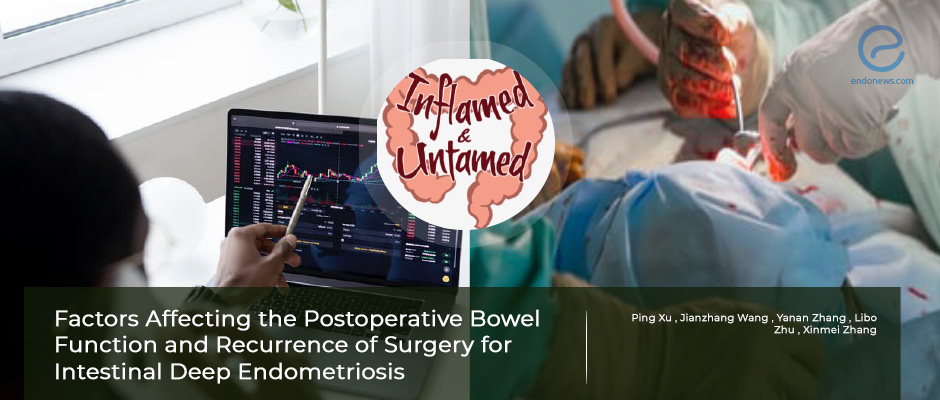Postoperative outcomes of deep intestinal endometriosis surgery.
Jul 22, 2022
The type of surgery is the most important risk factor for postoperative abnormal defecation.
Key Points
Importance:
- Selecting the optimal operation for deep intestinal endometriosis is one of the most challenging situations for gynecologists.
Highlights:
- The authors recommended conservative operation, especially full-thickness disc excision to improve the quality of life of intestinal deep endometriosis patients.
- Prevention of infection is very important to reduce the postoperative complications and the recurrence rate in these patients.
What's done here:
- This retrospective, single-center study included 60 women who underwent surgical treatment for bowel endometriosis at Zeijihang University Hospital of China.
- The study aimed to evaluate the factors affecting the complications of intestinal deep endometriosis surgery including the surgery type, infection, and the patient's age.
- The patients were classified into surgery types [disc excision (n=11), shaving (n=36), and segmental resection (n=13)] and statistical analyses were made on the surgery outcomes.
Multivariate regression analysis was utilized to investigate the impact of the stages of endometriosis and surgical steps (independent risk factors) on complications (and postoperative bowel dysfunction). The clinical characters, surgical procedures, postoperative treatment, complications, and recurrence rate were summarized and analyzed by using Lasso regression.
Key Results:
- Postoperative abnormal defecation occurred significantly more frequently in the segmental resection group when compared to the other two groups.
- The infection rate was significantly lower in the shaving group than in the other two surgical groups, and it was the most important independent risk factor related to postoperative complications and recurrences after conservative surgery.
- Ureteral fistulae were more likely to be associated with deep endometriosis mass of the uterosacral ligaments.
- When the risk factors such as age, operating time, operative bleeding, recurrence rate, and vaginal fornix opening during the surgery were taken into account, no statistical differences were found between the groups.
Strengths and limitations:
- The sample size of the groups and surgical complications were relatively small to statistically evaluate the results of the study.
- The follow-up after surgery is not clear.
Lay Summary
Invasion of endometriotic lesions to the bowels' mucosal and/or muscular levels is called intestinal deep endometriosis. These lesions are most frequently found in the rectosigmoid colon, followed by the rectum, ileum, appendix, and caecum.
The optimal surgical approach to intestinal deep endometriosis is still debated due to weighing risks to benefits. Therefore, the choice of radical surgery as segmental resection and conservative surgery as shaving or full-thickness wall excision is controversial. Improving the quality of postoperative life and decreasing recurrence should be the milestones of the surgical approach that should be chosen.
To find the optimized treatment measures of intestinal deep endometriosis, Xu et al. from the University of Zhejiang, China, statistically analyzed the surgical outcomes of 61 women with the diagnosis of intestinal deep endometriosis who underwent operations in their clinic between 2013 and 2019. Independent risk factors on complications of three types of colorectal surgery (shaving, segmental resection, and disk excision) were evaluated and the results are recently published in the academic journal named "Frontiers in Surgery".
When the three surgical groups were compared, there was no statistical difference in terms of the recurrence rate. When major complications of the surgery such as postoperative defecation problems, fistulae, and infection were evaluated, the results showed that rectovaginal fistulae only occurred after disk excision and ureteral fistulae only occurred after shaving. Fistula formation is associated with extensive deep lesions on the uterosacral ligaments.
The positivity of the histopathologic specimen margin after segmental resection was 22%, and the risk of leaving endometriotic lesions in the bowel after conservative surgery was 43,8 %. Conservative surgery is recommended due to its benefits for the postoperative quality of life. However, even in this type of surgery, multiple logistic regression analyses showed postoperative infection is a strong predictor of complications and recurrence. In addition to infection, having Enzian C1, C2, and C3 lesions are among other risk factors for postoperative recurrence.
The authors concluded that the postoperative bowel dysfunction in patients receiving segmental resection may be related to the extensive dissection of retroperitoneal space with the destruction of the surrounding neurovascular structures, as well as sympathetic and parasympathetic nerve bundles. The authors also emphasized that the most important part of rectosigmoid surgery for intestinal deep endometriosis, no matter radical or conservative, is the prevention of the infection.
Research Source: https://pubmed.ncbi.nlm.nih.gov/35774384/
postoperative bowel function complication recurrence segmental resection shaving disk excision intestinal deep endometriosis.

